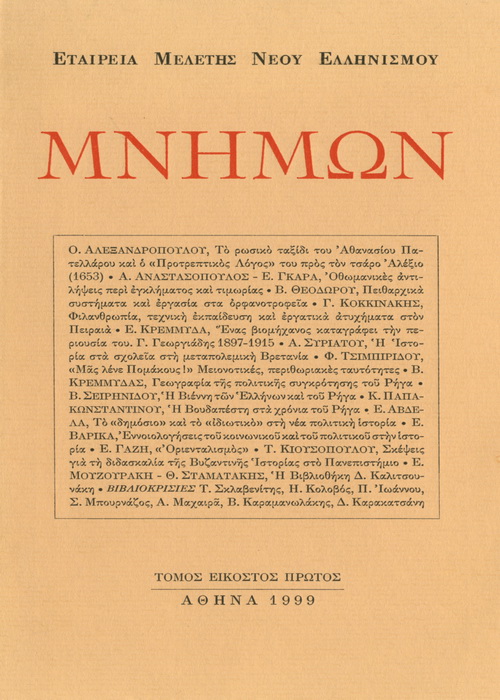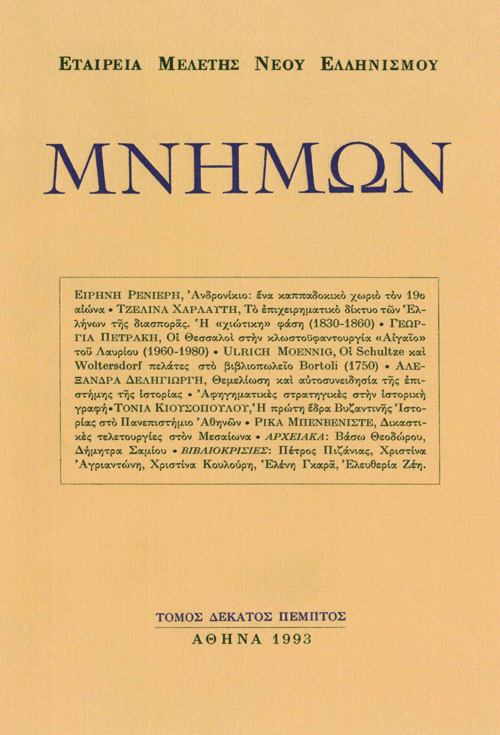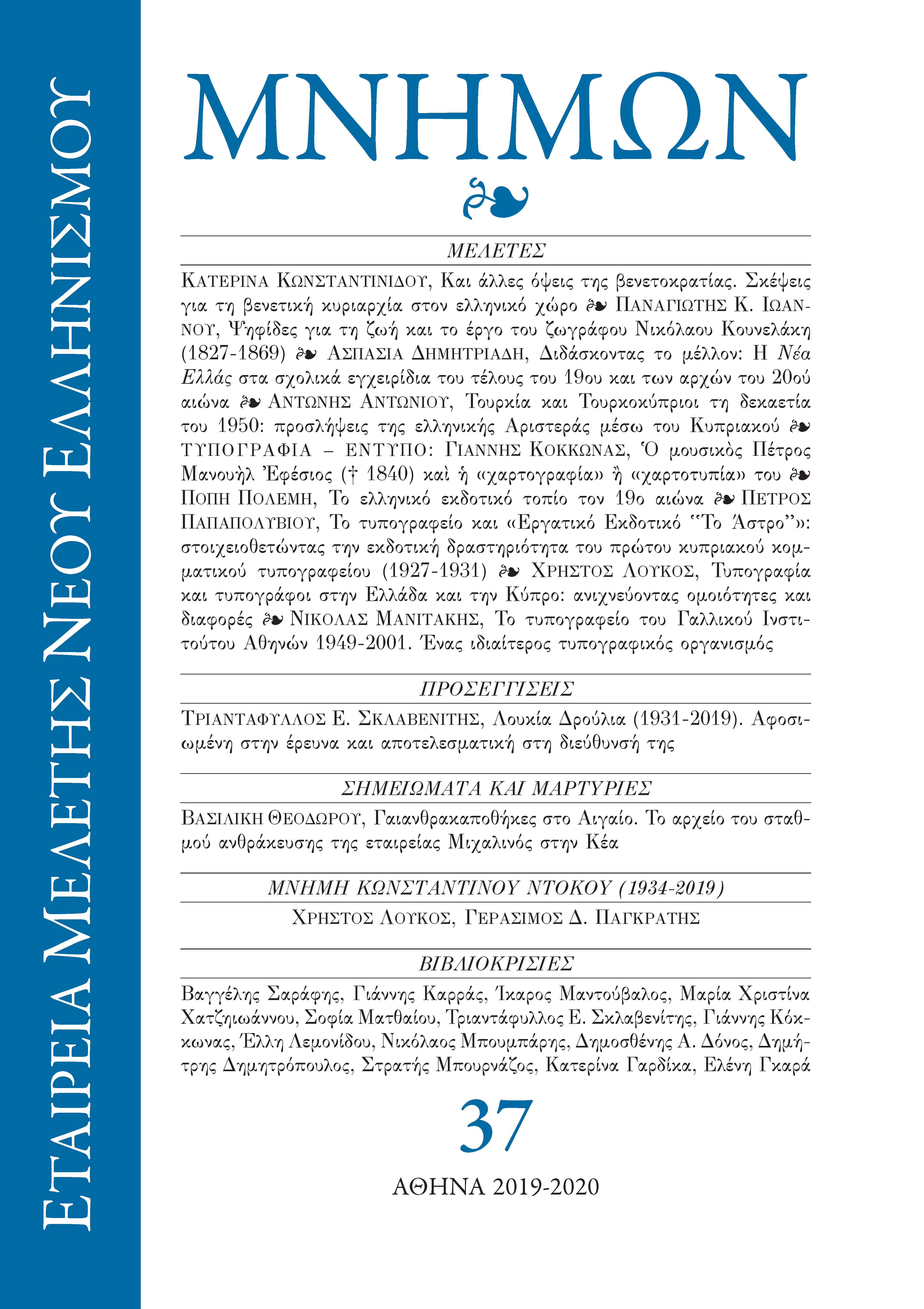ΟΘΩΜΑΝΙΚΕΣ ΑΝΤΙΛΗΨΕΙΣ ΠΕΡΙ ΕΓΚΛΗΜΑΤΟΣ ΚΑΙ ΤΙΜΩΡΙΑΣ
Περίληψη
Antonis Anastasopoulos - Eleni Gara, Ottoman perceptions of crime andpunishment
The present essay deals with aspects of Ottoman justice and consists offour parts. Part I (Law transgression and court) discusses the prerequisitesfor a case to come up for hearing at the Ottoman sheriat court. Aseventeenth-century litigation from the town of Veria (Karaferye) servesas a model in order to define criminal behaviour and to demonstratehow private differences acquire both a public and legal meaning whenbrought to court. Part II (Proving an accusation) is focused on the issuesof evidence and testimony as a vital part of the legal procedure, usingas example an eighteenth-century litigation from Istanbul. Part III(Sentence and settlement) deals with the issues of the sentences that the kadi passed, and of out-of-court settlements as an alternative legalinstitution, which was recognized and respected by the Ottoman judges.Part IV (Authority abuse as a crime) treats justice as protection of thereaya from the abuses of the askeri in the context of the official stateideology. Stress is put on the use of formulas in documents. Those formeda code that allowed both the subjects of the empire and its authoritiesto enter a variety of illegal acts under the easily recognizable headlineof «oppression» and to treat them accordingly.The basic idea that permeates the article is that Ottoman justicewas dispensed on the basis of fixed principles and procedures, and thatit is incorrect to treat the kadi as an arbitrary judge who adjudicatedat whim. These principles and procedures, though originating to a greatextent in the Islamic holy law, can be considered as Ottoman in thesense that they were redefined and given a new meaning within theEmpire's legal framework. Lastly, throughout the article special emphasisis put on the use of records of litigations, especially kadi sicilleriand ahkâm defterleri, as a means of reconstructing the Ottoman systemof dispensation of justice and of establishing the degree of its conformityto and deviation from the Islamic sheriat.
Λεπτομέρειες άρθρου
- Πώς να δημιουργήσετε Αναφορές
-
ΑΝΑΣΤΑΣΟΠΟΥΛΟΣ Α., & ΓΚΑΡΑ Ε. (1999). ΟΘΩΜΑΝΙΚΕΣ ΑΝΤΙΛΗΨΕΙΣ ΠΕΡΙ ΕΓΚΛΗΜΑΤΟΣ ΚΑΙ ΤΙΜΩΡΙΑΣ. Μνήμων, 21, 37–54. https://doi.org/10.12681/mnimon.728
- Τεύχος
- Τόμ. 21 (1999)
- Ενότητα
- ΜΕΛΕΤΕΣ
Οι συγγραφείς των άρθρων που δημοσιεύονται στο Μνήμονα διατηρούν τα δικαιώματα πνευματικής ιδιοκτησίας επί των άρθρων τους, δίνοντας στο περιοδικό το δικαίωμα της πρώτης δημοσίευσης. Άρθρα που δημοσιεύονται στο Μνήμονα μπορούν να χρησιμοποιούνται ελεύθερα, χωρίς δικαίωμα τροποποίησης (δημιουργία παράγωγου έργου) με αναφορά στο συγγραφέα και στην πρώτη δημοσίευση για μη κερδοσκοπικούς σκοπούς(άδεια Creative Commons 4.0). To Εθνικό Ίδρυμα Ερευνών διατηρεί το δικαίωμα να δημοσιεύει, να αναπαραγάγει, να παρουσιάζει στο κοινό, να διανέμει και χρησιμοποιεί άρθρα που δημοσιεύονται στο Μνήμονα σε οποιοδήποτε μέσο και μορφή είτε μεμονωμένα είτε ως μέρη συλλογικών έργων, για όλο το χρόνο διάρκειας προστασίας της πνευματικής ιδιοκτησίας και για όλες τις χώρες του κόσμου. Αυτό περιλαμβάνει ενδεικτικά και όχι αποκλειστικά, το δικαίωμα δημοσίευσης των άρθρων σε τεύχη του περιοδικού Μνήμων, αναπαραγωγής και διανομής μεμονωμένων αντιγράφων των άρθρων, αναπαραγωγής ολόκληρων των άρθρων σε άλλη έκδοση του ΕΙΕ, και αναπαραγωγής και διανομής των άρθρων ή περίληψης αυτών με χρήση πληροφορικού συστήματος αποθετηρίου.





